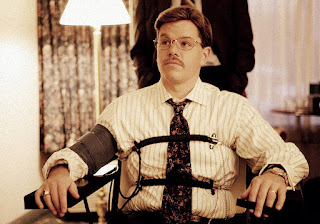It’s at that point when Matt Damon’s character, genius everyman Will Hunting, finally lets his guard down and reveals the abuse he experienced as a child, which Williams’ psychiatrist, Sean Maguire, relates to, being a former abuse victim himself. Sean repeats, “It’s not your fault. It’s not your fault.” Will, unable to keep up his tough guy façade, eventually starts weeping; thanks to Damon’s stellar performance, the tears are justified. Will also could be diagnosed with a severe attachment disorder. He was abandoned by his parents and abused by his foster parents so he developed strong defense mechanisms against intimacy as coping method. This also appeared to be cured after his breakthrough with Sean.
Source: www.complex.com

Alice in Wonderland has all of Mr. Burton’s hallmarks—the silhouetted and broken tree branches, the haunting Danny Elfman score, the pasty heroine (Ms. Wasikowska has an inside track on playing the lead in
The Claire Danes Story). Burton's title character is Alice Kingsleigh, an imaginative and strong-willed teen — played by Mia Wasikowska, an up-and-coming actress who resembles both Claire Danes and Gwyneth Paltrow. At several points in the story,
Alice in Wonderland questions her own identity and feels ‘different’ in some way from when she first woke. Approximately 1% of the UK population experience these feeling constantly, and suffer from a syndrome known as depersonalisation disorder (DPD). DPD is characterised by a disruption in the integration of perception, consciousness, memory and identity, producing a disordered and fragmented sense of self. Patients often comment that they feel as though they are not really there in the present moment, likening the experience to dreaming or watching a movie. There is a high association between DPD and childhood abuse, and the onset of symptoms often coincides with stressful or life-threatening situations, which indicates it may initially arise as an adaptive response to an overwhelming situation. DPD acts as a sort of defence mechanism, allowing an individual to become disconnected from adverse life events, making the situation easier to deal with. In fact, it is estimated that 51% of patients with DPD also meet the criteria for post-traumatic stress disorder (PTSD). Through slight changes in neural activity in relatively localised brain regions, phenomena can arise which are as peculiar and fascinating as those experienced by Alice when she first fell down the rabbit hole.
neurosciencenews.com
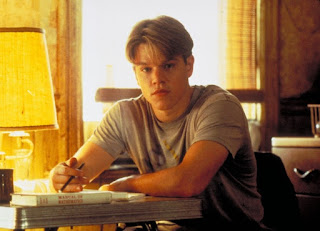
From his earliest days, Matt Damon displayed a strong interest in acting and in playing a role in a make believe world. He was the kid who took play-acting more seriously than his childhood friends. Unlike many of his contemporary fellow stars, Damon has gone on to display as much skill and intelligence behind the camera as he does attitude and presence in front of it. He’s not only handsome, but clearly a talented actor too. With a high IQ (160 on Cattell’s scale, 139 in Wechsler’s scale) this combination of strong on-camera presence with off-screen intelligence marks him out as a different kind of movie star. While taking any part in school plays or drama classes, Matt would take his skills to the streets of Cambridge at weekends to earn a little money, break dancing in Harvard Square for the tourists. He also spent weekends performing in children’s theatre at the Wheelock Family Theatre in Boston during his school years. He had to work hard at his craft and hope for a whole lot of good luck. To that end, Matt threw himself into his acting endeavours, winning the lead role in a school production of
Guys and Dolls.
We’re all familiar with the James Dean wannabes and that’s definitely not Matt Damon. He’s a pleasant guy, one of those guys who can get along with the crew, with anybody. ‘
School Ties was a bitter pill to swallow,’ admitted Damon, ‘because I didn’t come out of that a star. Brendan Fraser and Chris O’Donnell got to be huge out of that movie and I’d be lying if I said there wasn’t any envy there. Yesterday you were hanging out with them and the next day they’re these huge movie stars. I thought my performance was pretty good, but I didn’t have a publicist. I didn’t do many interviews, and the phone just didn’t ring. It was tough.’ Matt had good reason to worry. After
School Ties he was auditioning constantly, but seemed to be getting nowhere. Far from reassuring Skylar (his college sweetheart), Matt’s superficial success with
School Ties only served to make her worry about their potential future together. Could she rely on him to actually make a career of it?

School Ties (1992): The role was Charlie Dillon, a rich kid whose racism makes life hell for a Jewish student in a 1950s New England prep school. It was clearly a challenging part, one that would give Matt a chance to show off the skills he’d been learning. It could even be his calling card to Hollywood big time. He was lucky to get such a featured role, though, as many of the actors where shifted from part to part as development of the film went on. Despite the fact that the star of School Ties was Brendan Fraser and Matt was billed fourth, it’s his character of Charlie Dillon that stands out. What shines through in Matt’s performance is his ability to play a charming but duplicitous character well. He uses his good looks and social advantage to escape responsibility - and it’s these very traits that Matt was required to display in greater abundance for the role of Tom Ripley in Anthony Minghella’s The Talented Mr. Ripley (1999).
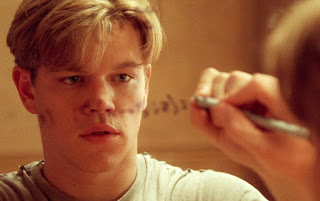
Despite having put so much of himself into the script, Matt Damon wasn’t precious about
Good Will Hunting. He knew he was an actor who’d become a screenwriter by default and was happy to listen to the advice of Hollywood’s experts. ‘We listened to people’s opinions, but a lot of it was taking note and not making changes, too.’ ‘I look at acting, writing, and directing as a trade, pure and simple,’ admitted Matt, who refused to see himself as any kind of script writing genius after
Good Will Hunting won him an Oscar.
Matt was most pleased to have the chance to play opposite veteran actress Teresa Wright. Wright had won an Oscar back in 1942 for Best Supporting Actress in
Mrs. Miniver, but she was impressed with the obvious talents of the young newcomer. ‘He’s marvellous to work with,’ she confided. ‘He’s a great help to other actors and doesn’t have a thought about being a star. He truly loves acting. What makes you interested in the character of Rudy is that his desire to do a good job is a direct reflection of Matt, who has great sincerity behind what he does and tremendous energy.’ While he was keen to learn from the 79-year-old Wright, the most fascinating woman on the production as far as Matt was concerned was the youthful Claire Danes.
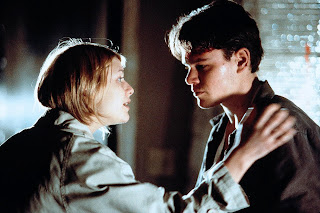
From his first involvement in The Rainmaker, Matt had his eye on Claire Danes - she played opposite him at his screen test having already been cast. She’d first been noticed on the television show My So Called Life before playing Juliet opposite Leonardo DiCaprio in Baz Luhrmann’s William Shakespeare’s Romeo and Juliet (1996). Claire Danes clearly made an impression on Matt, and the pair soon embarked on a torrid on-set affair. ‘I fell in love with her,’ said Matt of Danes. ‘She’s fabulous.’ Still smarting from the end of his relationship with Skylar - which he was busy recreating in an idealised form in his screenplay for Good Will Hunting - Matt was ready for a new romance. ‘She’s an amazing actress, a wonderful person. I learned a lot from her.’ The romance was a passionate but short-lived one, lasting for the duration of the shooting of The Rainmaker. The pair parted as friends when shooting concluded early in 1997.
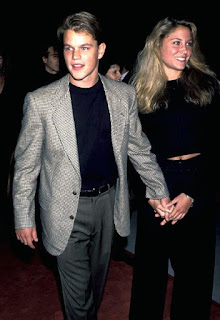
Skylar Satenstein was a medical student at Columbia University. She lived in New York City. ‘We were college sweethearts,’ said Matt. ‘It was a long distance romance which was really hard. We did it for years and then it looked as if the dynamic was becoming so fucked up, because we were trying to avoid the thing of not seeing each other for a long time and then being extra careful not to say something that might upset the other one. We decided to leave it to the Gods - if it’s meant to be, it’s meant to be.’
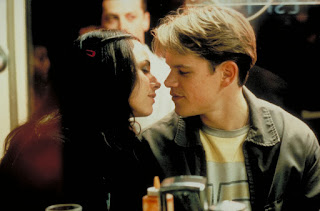
The impression Minnie Driver made on Damon during the Good Will Hunting audition wasn’t just down to her acting. The young actor was immediately captivated by her easy physicality and no-nonsense nature. ‘I couldn’t take my eyes off her during the audition,’ he admitted. ‘When she left it was just clear around the room that we would never get a better actress than that.’ During the making of the film, Matt and Minnie became an item, in an echo of Matt’s affair with Claire Danes during The Rainmaker. Although most of the cast and crew knew what was going on off screen between the leading man and leading lady, Matt and Minnie attempted to keep as quiet as possible about their blossoming relationship. ‘We were trying to keep things under wraps, because I never wanted to take anything away from her performance, which is tremendous,’ said Matt. ‘The last thing I would want would be for anyone to misconstrue it, to think she got the part because we were going out. We met for the first time at the auditions.’

Despite his rivalry with the Affleck brothers, Matt had been extremely popular at Cambridge Rindge. ‘He was the guy who sat in the back of the bus always making out with his girlfriends,’ remembered actor Casey Affleck. Matt’s date for prom dance had been Tammy Jones, tall and good looking. ‘I thought she was really pretty and I was hopelessly in love with her,’ he admitted, ‘and it turned into the worst date I’ve ever had! It was my senior prom. The girl that I went with hooked up with another guy, while I was in the room! I was hopelessly in love and ended up crying myself to sleep. I was heartbroken, crestfallen.’ With Good Will Hunting finished, the fun was just about to really begin for Matt Damon. The months following the film’s December 1997 release would bring both heartbreak and triumph for the young actor from Boston who’d written himself a role simply because no one in Hollywood would employ him.

Not so happy at Matt’s success was Minnie Driver, who attended the 1998 Oscars in a frosty mood, steering well clear of Matt and determined to get one up on his new girlfriend Winona Ryder. Said a friend of Minnie: ‘The main reason she wants to win is so that she can stand up in front of Winona and wave the Oscar at her.’ Minnie lost out to Helen Hunt for As Good As It Gets. She betrayed her frustrations as television cameras picked out her stoic non-reactions as Good Will Hunting scooped other awards. She may have been secretly pleased when Matt lost (having not expected to win given the much more experienced competition) the Best Actor Award. While Ben Affleck was happy to stop off to give Minnie a consoling hug, she and Matt made sure they stayed at opposite ends from each other. The breakdown in their relationship was a sad legacy surrounding all the celebrations for the awards won by
Good Will Hunting.
Matt saw the rumours and innuendo as the downside to fame. Although he didn’t set out to be famous - after all he’d written
Good Will Hunting just so he could play the role - now he was here, he was determined to make it as positive an experience as possible. In the spring of 2000 the breakdown in the relationship between Matt and Winona Ryder had become apparent when Matt moved out of the house they shared in Beverly Hills. Ryder had been expected to accompany Matt on his promotional tour of Europe to promote
The Talented Mr. Ripley, but he went alone.

Matt Damon finally found his ‘soul mate’ in the non-Hollywood ‘civilian’ world when he met Luciana Bozán Barroso, an Argentinian barmaid he encountered while filming Stuck on You in Miami in 2003. Six years his junior, Luciana - known as Lucy - was born in 1976. Matt incongruously met Lucy in the ‘Crobar’ while on a break from filming. ‘I was hiding behind the bar,’ admitted Matt, ‘because I was getting hassled … I went back and Lucy said, “What the hell are you doing here?” because I didn’t work there and I was behind her bar. I genuinely feel like - people have that saying about seeing someone across a crowded room - I swear to God, that happened to me… something incredible happened the first time I saw her.’ Lucy was soon an ex-bartender who accompanied the star on his 2004 tour across Europe shooting on Ocean’s Twelve, before returning with him home to Boston to meet his family, where he then worked on making The Departed. Reflecting on his love at first sight with Lucy, Matt said: ‘I can’t imagine my life having not gone down that road. I can’t imagine what my life would be now. I don’t want to imagine it.’

It was back to extreme macho action theatrics for Matt Damon, when he took on the leading role in science fiction action thriller Elysium (2013). Part of the attraction for him was the depiction of a future 2154 society in which the extremely rich ‘one per cent’ of the population inhabit ‘Elysium’, a man-made orbital habitat, leaving the rest to fend for themselves on the polluted remnant of a devastated Earth. Matt played Max Da Costa, another ‘everyman’ representative of humanity who could function as a modern Jesus. ‘I like to think it’s a hopeful message,’ said Damon: ‘Even in a future where it’s every man for himself, it’ll be possible to hold on to his humanity.’ "Building a strong, solid, educated middle class is ultimately the best thing for America. There's a misconception that leaders lead. They don't. They follow. Someone like FDR. Every great movement has come from the bottom up," affirmed Damon. The Chicago Tribune’s Michael Phillips praised Matt’s filmic choices. ‘Damon has an awfully good nose for material; even when Elysium grows allegorically simplistic or familiar, the script avoids pounding cliché, and Blomkamp and his design and effects teams give us a plausibly harsh idea of things to come.’

Between The Adjustment Bureau, Elysium and The Zero Theorem, Matt Damon appeared to have caught a taste for science fiction. It was an interest he’d secure with the ‘stranded astronaut’ double whammy of Interstellar (2014) and The Martian (2015), before the star contemplated reluctant his long-awaited return to the world of super-spy Jason Bourne. His political engagement in real world issues, in particular to do with the anti-war movement, poverty, climate change, and water rights, had given him clout in a world beyond Hollywood, but had also influenced his choice of movies with messages, from Syriana to Green Zone and Promised Land, as well as appearing in family-friendly fare such as We Bought a Zoo, choices increasingly informed by his own growing family with wife Luciana Barroso, one of Hollywood’s most successful marriages.

His tendency to speak without thought haunts Damon to this day, with bad press over his comments on diversity and homosexuality in Hollywood providing a cloud over 2015 which was otherwise one of his most successful years. UPDATED: "What have you learned from that whole experience?" the Today Show host Kathie Lee Gifford asked Damon. "Well, I really wish I'd listened a lot more before I weighed in on this," he replied. "Ultimately, what it is for me is that I don't want to further anybody's pain with anything that I do or say." "So for that I'm really sorry," Damon said, before throwing his support behind Time's Up and the women behind the anti-sexual harassment initiative. "A lot of those women are my dear friends and I love them and respect them and support what they're doing and want to be a part of that change and want to go along for the ride."
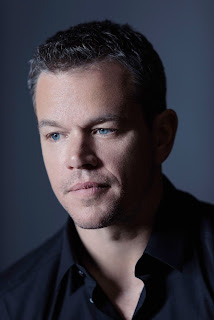
Summing up Matt’s career to date, the New York Times’ M. Dargis perceptively wrote: ‘Damon tends to win respect, not swoons, from film critics, but great directors can’t stay away. His boyish looks have certainly helped him land roles, and remain essential to his appeal... his ability to recede into a film while also being fully present, a recessed intensity, distinguishes how he holds the screen. Damon eases into roles so quietly you rarely see him acting. It’s the type of quiet that can be mistaken for no acting at all and that, much like his trademark smile, can prove deceptive. People magazine anointed him one of the sexiest men alive, but he seems out of place alongside the silky likes of [Johnny] Depp. [His] Janus-like quality - the boy next door who turns out to be the killer, the thief and the spy among us - makes Damon a consistently surprising screen presence.’ —"The Talented Matt Damon" (2016) by Brian J. Robb

“Suburbicon” is The Lodges’ story which has its roots in a screenplay that Joel and Ethan Coen wrote in 1986 — the same year, incidentally, that gave us David Lynch’s “Blue Velvet,” the greatest dark-side-of-suburbia movie ever made. In dusting off the script, Clooney and his longtime writing partner, Grant Heslov opted to mix in the Levittown unrest as a way to update the material for 2017. For a while, at least, the unrepentant nastiness of the plotting and the intense commitment of the actors are enough to sustain you through the proceedings. You may feel a rush of pity for Moore, whose stylized luminosity has been far better served in other ’50s settings, and especially for Damon, whose handsome features seem almost putrefied with self-loathing. Julianne Moore gives a perfectly judged comic performance as a Barbara Stanwyck-like femme fatale, whose only drawback is that she is so utterly dimwitted. Damon is increasingly creepy as the repressed family man who dreams of living on the beach in Aruba.

Matt Damon plays yet another all-American type. His character, Gardner Lodge, is a seemingly affluent husband and father with a 10-year-old son, Nicky (Noah Jupe.) His wife Nancy is in a wheelchair, and her lookalike sister Margaret (Julianne Moore) is also living with them. Gardner couldn’t be more wholesome and upstanding – or at least, that is how it appears. This may be bright, sunny, Eisenhower-era America, but the filmmakers go out of their way to show its dark underbelly in as comic a way as possible. The filmmakers have lavished abundant care on every colorful detail of their Atomic Age aesthetic but their fatal miscalculation is to reduce the Mayers family to a similarly decorative function. Treating black characters as a symbol of unalloyed goodness isn’t, in the end, much more progressive than denouncing them as everything that’s wrong with this country. Clooney wants to both indulge and critique the vile, amoral stupidity of his characters, to draw us into a moral dead zone that might prove instructive and even edifying. But it would require a filmmaker of either greater intellectual distance or tonal finesse to illuminate the toxic, ever-present legacy of white supremacy rather than merely restaging it, or to turn this kind of cut-rate misanthropy into art.
Source: www.latimes.com
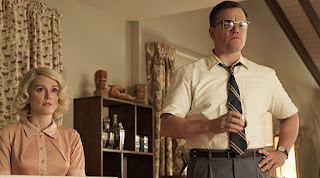
“Suburbicon” has a message about first impressions: Don’t trust them. For all intents and purposes, this is a Coen brothers picture. In many ways,
Suburbicon as harsh and pitiless as their “No Country for Old Men,” achieving that level of hair-raising darkness with a brutal home-invasion sequence near the beginning. Damon giving a performance that renders his character downright chilling and Jupe doing heart-rending work as a child emotionally buffeted by the grievously flawed behavior of the adults who are supposed to love and protect him.
Source: www.seattletimes.com
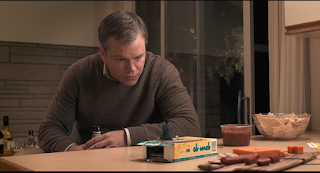
The social commentary of
Downsizing and the satire interested him though. Damon turned down the lead in 2016's award-winning drama
Manchester By The Sea to do
Downsizing because he wanted to work with Payne. Casey Affleck took the role and won an Oscar for it. Said Damon: "When Payne gave me the script, I felt it was a completely original story. It is this kind of crazy, digressive left turn it takes in the middle of the movie, and I get to Norway and am in love with a one-legged Vietnamese political dissident." Asked about the current presidency: "For me, it is just about trying to get through this presidency without this behaviour becoming normalised, because we have to return to our sense of decency. We have to have a sense of shame," Damon said. "I don't know how to raise children in the face of that kind of boorishness coming out of the White House. I just ignore it for right now."
Source: www.tnp.sg
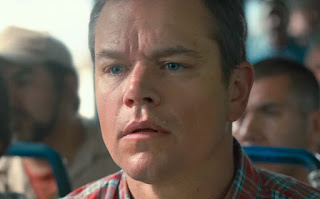
Downsizing sounds appealing to Paul Safranek, a protagonist cut in the mold of a Frank Capra hero. It helps that he’s played by Matt Damon, who brings a dignity to the character recalling Jimmy Stewart. Paul is a classic Middle American paradigm of basic decency: an occupational therapist committed to helping relieve the aches of Omaha Steaks’ workers, he’s the kind of guy who considers caring for his ailing mother and pleasing his listless wife Audrey (Kristen Wiig) the highest honor.

After conversations with two shrunken high school classmates at their reunion, Paul and Audrey decide to make the big leap to downsize. They attend a sales pitch at Leisureland, a model community promoting itself as a middle-class utopia. The film expands its frame with the introduction of Hong Chau’s Vietnamese dissident Ngoc Lan, an activist who gets shrunk not as liberation but rather as a form of government oppression. She works as a cleaner in Paul’s building and eventually introduces him to a world beyond the Leisureland walls. Ngoc forces Paul to confront his notions about where his efforts to help humanity are best suited, a worthy question to consider – but one that also feels better suited for a different film.

No matter the narrative hiccups, the issues raised are fascinating to ponder because Alexander Payne and Jim Taylor take the time to consider them fully. The capacity to shrink humans for population control is a far-fetched sci-fi concept, but the stretching of our planet beyond its capabilities has already begun.
Downsizing dares to ask if humans will be ready to make the sacrifices necessary for the survival and preservation of the species is on the line. Payne and Taylor can pose the question without inducing complete debilitation because it’s one they ask with genuine concern and empathy for their fellow earthlings.
Source: www.slashfilm.com




















